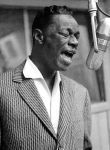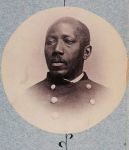Week of March 1925
March 19
1620—The first Black child born in America, William Tucker, was probably born on this date in Jamestown, Va. However, some controversy surrounds the exact date. What we know for sure is that he was the son of two of the first Africans brought to America as indentured servants in August
 |
|
NAT KING COLE
|
1619—Anthony and Isabella. We also know he was baptized on Jan. 3, 1624. Further, there is debate as to whether his last name was actually “Tucker.” It seems that many historians simply assumed that the child was given the last name of the man on whose plantation his parents worked. While this would later become the practice on many plantations, there is no documentation that Anthony and Isabella actually gave their son the last name of Tucker.
1919—Singer Nat King Cole is born in Montgomery, Ala. In addition to his considerable talents as a singer, Cole—the father of Natalie Cole—was the first Black American performer with his own syndicated radio program and later a network television variety show. The TV started at 15 minutes, expanded to half-an-hour but was then dropped due to lack of White advertiser support.
March 20
 |
|
MARTIN R. DELANY
|
1852—The leading Black nationalist of the 1800s, Martin R. Delany, publishes his manifesto entitled “The Condition, Elevation, Emigration and Destiny of the Colored People of the United States.” Delany, who fought in the Civil War to end slavery, became frustrated with American racism and argued that Blacks were “a nation within a nation” who should consider returning to their Africa homeland. Delany, who became a doctor, would later advance an argument for reparations saying, “They [Whites] had been our oppressors and injurers. They obstructed our progress to the high positions of civilization. And now it is their bounden duty to make full amends for the injuries thus inflicted upon an unoffending people.” Delany died in Wilberforce, Ohio in 1885.
1852—“Uncle Tom’s Cabin,” a novel by Harriet Beecher Stowe, was published in Boston and became a national best seller. The novel was based in part on a real life Maryland slave named Josiah Henson. Many considered Henson a typical “Uncle Tom” who was over accommodating to Whites and accepting of his condition as a slave. Revisionist historians have treated Henson more kindly suggesting he was simply being pragmatic and actually helped other slaves.
1883—Jan Matzeliger receives a patent for the “shoe lasting” machine that would revolutionize the show industry, significantly reduce the cost of shoes and make Lynn, Mass., the shoe-making capital of the world. Matzeliger was born in Dutch Guiana (today’s Surinam) and arrived in America at 18 or 19 speaking very little English. His invention would eventually enable an entire shoe to be produced in 60 seconds by one machine. The patent was purchased by the United Shoe Company. Unfortunately, Matzeliger died at 37 before he was able to realize any of the enormous profits produced by his invention.
1957—Filmmaker Spike Lee is born in Brooklyn, N.Y.
March 21
1955—Walter White dies. As head of the NAACP, White was perhaps the most prominent and powerful civil rights leader of the first half of the 20th century. The light-complexioned, blue- eyed White became somewhat of a legend in 1919 when he “passed for White” in order to investigate the notorious Elaine, Ark., race riot when marauding bands of Whites killed more than 200 Blacks. He barely escaped with his life when news of his true identity leaked out.
1960—The Sharpsville Massacre occurred in then White-ruled South Africa when police fired on Blacks protesting the country’s “pass laws” that greatly restricted the movement of the majority African population. At least 67 demonstrators were killed and 186 injured or wounded.
1965—The historic Selma to Montgomery March calling for full voting rights for African-Americans began under federal protection. The original march had actually started on March 7. But the more than 600 demonstrators were attacked with clubs and tear gas by state and local police at the Edmund Pettus Bridge. Organizers, including Dr. Martin Luther King Jr., then went to court to get confirmation of their constitutional right to demonstrate. The court battle was won and the march resumed under federal protection March 21. Five months later President Lyndon Johnson signed the historic 1965 Voting Rights Act.
March 22
1492—Alonzo Pietro sets sail with Christopher Columbus as he begins his famous journey to find a new trade route to China but accidentally “discovers” the Americas. Pietro was one of Columbus’ navigators. He was known as “il Negro”—The Black.
March 23
1916—Marcus Garvey arrives in the United States from Jamaica. He would go on to build the largest Black nationalist and self-help organization in world history—the Universal Negro Improvement Association. The UNIA owned everything from bakeries to a shipping line. It would develop chapters throughout major cities in the U.S., Europe, Africa and the Caribbean. “Garveyism” emphasized racial pride, economic empowerment, Blacks doing for self and the establishment of a powerful Black nation in Africa to give protection to Blacks throughout the world.
1942—Scholar and political activist Walter Rodney is born in Georgetown, Guyana. Rodney would become one of the leading intellectual forces behind the worldwide Black nationalist and Pan-Africanist movements of the 1960s and 1970s. He was a brilliant scholar who traveled widely and among his major writings was the book “How Europe Underdeveloped Africa.” He died in a car bombing in Guyana in 1980.
March 24
1837—Blacks in Canada are granted the right to vote. Most of these Blacks had escaped from slavery in America.
2002—Halle Berry becomes the first Black woman to win an Oscar for Best Actress. She won for her role in the movie “Monster’s Ball.” Berry was born Aug. 14, 1966 in Cleveland, Ohio, to an African-American father and a Caucasian mother.
March 25
1931—Ida B. Wells-Barnett dies. Wells-Barnett was one of the leading Black female activists in America for over 30 years. Born in Holly Springs, Miss., she became a crusading journalist against racism and injustice with her Memphis, Tenn.-based newspaper—“The Free Speech and Headlight.” When a prominent Memphis Black man (and friend or hers) was lynched in 1892, she launched a national campaign against lynching. In 1909, she became a member of the Committee of 40 that laid the foundation for the organization that would become the NAACP. But she later sided with scholar W.E.B. Du Bois when he accused the NAACP of not being militant enough. Wells-Barnett would also later join with White suffragettes in demanding that women be given the right to vote.
1931—The “Scottsboro Boys” are arrested and accused of raping two young White women—a crime which evidence suggests (then and now) never occurred. However, the saga of the nine Scottsboro Boys (young Black men aged 12 to 20) would stretch out over a period of nearly 20 years in a series of trials, convictions, reversals and retrials. The racism of the period was so thick that even when one of the young White women recanted and admitted that no rape had occurred, an all White Alabama jury still found members of the group guilty and sentenced them to death. The convictions were overturned by the U.S. Supreme Court and more retrials and new convictions followed. Eventually, either by paroles or escapes, all the Scottsboro Boys would leave Alabama prisons. The last one died in 1989.
1942—Aretha Franklin, the “Queen of Soul” music, is born in Detroit, Mich.
(This Week in Black History is compiled by Robert Taylor. He welcomes comments and additions at SirajT12@yahoo.com. Also, leave a brief message at 202-657-8872 in you are interested in joining a local Black History Club.)